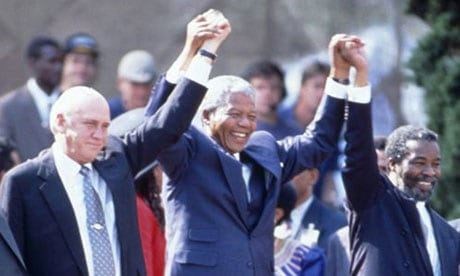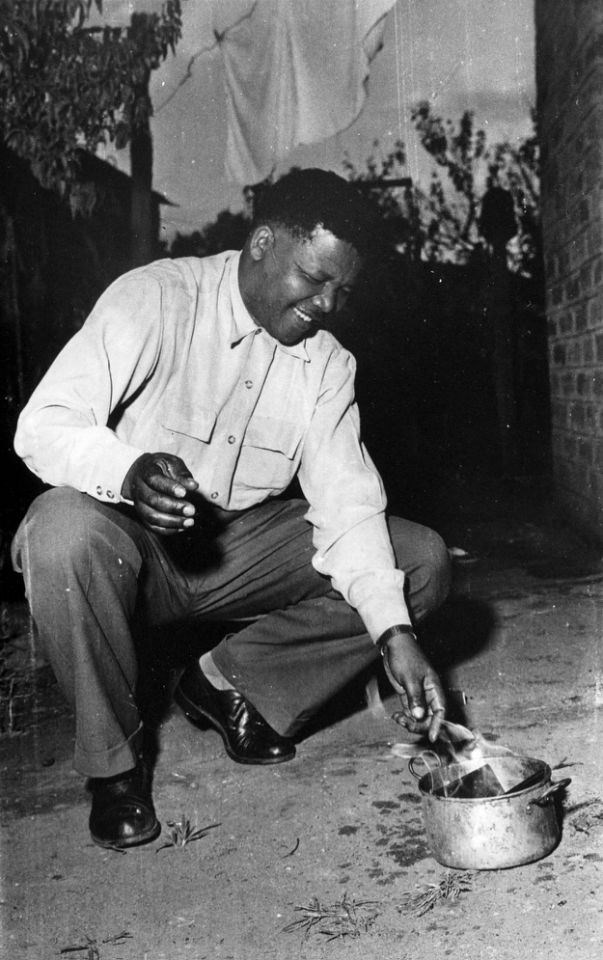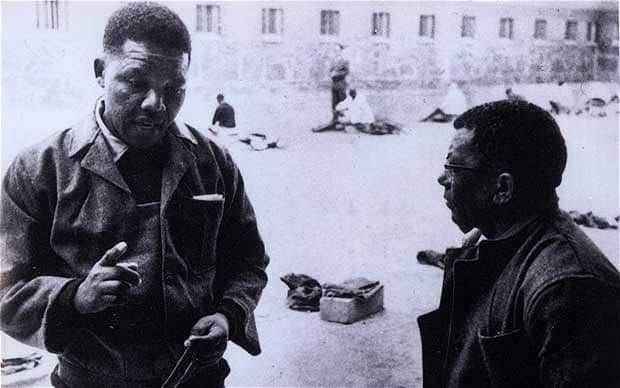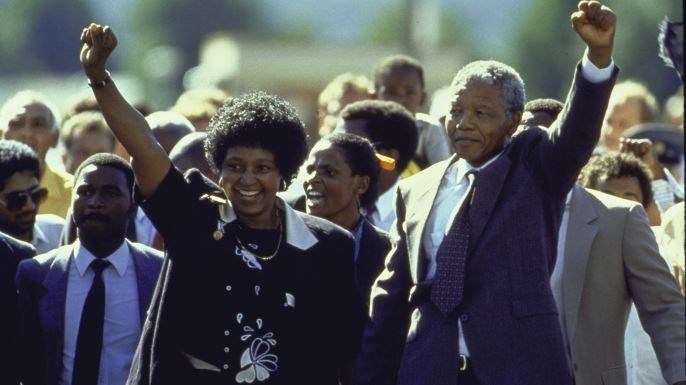"Education is the most powerful weapon which you can use to change the world."
"If you talk to a man in a language he understands, that goes to his head. If you talk to him in his language, that goes to his heart."
“For to be free is not merely to cast off one's chains, but to live in a way that respects and enhances the freedom of others.”
“Embracing the wrong kind of hero has the potential of fracturing the sacred bonds of society,” as insightfully asserted by Charles Harper in his essay “How Should We Choose Our Heroes.” Although societies naturally choose their heroes based on admiration, Harper continues to explain that “in the absence of positive heroes, a society will choose others as it did in Nazi Germany and Serbia” (Harper). From Harper, we understand not only the absolute importance of heroes, but also the significance in finding the right kinds of heroes. Beyond mere admiration, which may not be based on substance, we must focus on key character traits necessary for a person to be worthy of our respect. One key trait defining heroism is compassion. From a freedom fighter who risks life itself for the people and encourages them to use their voice to stop tyranny, to a person who simply helps his or her neighbor in times of need, we should admire those with empathy for their fellow man, and call them heroes. Thus, a hero must be able to see the need and suffering of others and feel a deep compulsion to help save these people from a broken world. The operative element of compassion is having a passionate determination to go beyond feeling to action and accomplishment. The second great essential trait of a hero is that they must have devotion for a cause they believe in. They should possess the wisdom and intelligence to maneuver through the obstacles encountered along the way to success. Underneath circumstances, both the freedom fighter and the neighbor believe in the absolute value of the individual human being and work toward justice for all.
Both of these concepts meet in the person of one man who became a hero to the world. In South Africa, a country bounded under a minority rule after centuries of colonization, segregation and discrimination grew worse and worse over time, as the divide between white and black citizens became more prominent than ever before. Poor Africans cried out for someone to fight against the cruelty of government “apartheid” laws, laws focused on racial segregation and discrimination dictating every corner of their lives. Finally, one man realized the course of action needed to take place to fulfill the dream of an equal South Africa, and he took a stand against the oppressive government. After dedicating himself to this South African struggle, the man had to pay a price, twenty-seven years of cruel treatment in prison. However, this man still held hope that one day he would be able to see a free and democratic South Africa, and his undying spirit inspired thousands of others to stand passionately with him in hope and determination. When he was released, he worked tirelessly to establish peace in his country where the threat of “race war” loomed over a divided nation. Later, when he was elected by South Africans in their first ever democratic election; thousands cheered on as the dream of a free South Africa was finally a reality, thanks to the man’s lifelong efforts for equality. This man was Nelson Mandela. Born as the son of a tribal chief in 1918, Nelson Mandela could have had a comfortable life as a heir to chiefdom in the relative obscurity of his village in Mthatha; however, he left this behind in order to go to college and pursue a law degree. As a lawyer, he helped black South Africans with legal troubles due to discrimination by federal law, or general discrimination from white South African citizens. Mandela later joined the African National Congress, or ANC in 1947, a political party and activism group that advocated for the fair treatment of Africans. After dedicating his life to actions against the federal government, he and others from the ANC were convicted of treason in 1964 and sentenced to life in prison. On Robben Island, described as the most inhumane prison in South Africa, Mandela was subjected to racism and many degrading tasks by the all-white wardens and prison guards. When Mandela was finally released on February 11, 1990, due to both public and federal outcry, he had spent nearly one quarter of his life incarcerated. Later, when Mandela was elected South African president on April 27, 1994, the world hailed his efforts towards peace and equality that changed his nation into a better place for all. Nelson Mandela’s defiance against institutionalized racism and his undying perseverance on the harsh, cruel road to freedom for his country fanned winds of change that spread from South Africa to other nations, inspiring the call for equality across all races, and made Mandela one of history’s most respected and admired heroes.
 Mandela with his deputies, F.W. de Klerk and Thabo Mbeki, at his presidential inauguration.https://www.theguardian.com/world/2013/dec/06/fw-de-klerk-nelson-mandela-death
Mandela with his deputies, F.W. de Klerk and Thabo Mbeki, at his presidential inauguration.https://www.theguardian.com/world/2013/dec/06/fw-de-klerk-nelson-mandela-death
 Mandela burning his pass book in defiance of the government's strict rules against colored people, 1952.https://uk.news.yahoo.com/photos/nelson-mandela-a-life-in-pictures-1370860057-slideshow/Mandela’s courage defined the defiance he led against his country’s racist government. During his time with the ANC as president of The Youth League, Mandela planned and led peaceful rallies against these laws: “The Youth League responded to this racist political climate by calling for civil disobedience--non-violent strikes and ‘stay-at-home’ days in protest of no less than 600 apartheid laws” (Contemporary Black Biography). Mandela’s call to action with The Youth League against institutionalized government racism brought forth a growing fervor for equality amongst the downtrodden South Africans. This battle for human rights and justice kindled by Mandela demonstrates his heroism, as he tried to change his country for the good of his own people. But as the strikers still needed to eat and had to go back to their jobs to get their paycheck, the days spent in protest and strikes were limited in number. In the end, the strikes raised hopes and Mandela himself gained popularity with the people, but the government still resisted change. Eventually, Mandela felt forced to move beyond non-violent protests reluctantly embracing violence. Mandela, explaining the circumstances for the formation of Umkhonto we Sizwe, an underground group that used guerilla warfare against the government, describes how government use of force against peaceful protesters had led him to this conclusion: “At the beginning of June 1961, after a long and anxious assessment of the South African situation, I, and some colleagues, came to the conclusion that as violence in this country was inevitable, it would be unrealistic and wrong for African leaders to continue preaching peace and non-violence at a time when the Government met our peaceful demands with force” (Mandela 422). Mandela and his colleagues took the risk of using violence, the only way to be heard, because they believed every means necessary had to be used to win their fight for equality. His courage to take such a risk demonstrates how dedicated Mandela was to achieving peace within his country. Beyond demonstrating his willingness to risk personal suffering due to stepping outside the boundaries of the law, Mandela’s continued defiance against a racist, cruel, inhumane government showcases his dedication towards the cause of freedom, a cause he has built his life on, has spoken for, and has inspired thousands to fight for -- against all odds. The necessity of leadership cannot be underestimated, for, as an old proverb says, “When there is no vision, the people perish”(King James Version, Proverbs 29.18). His compassion for the plight of the people and determination to bring about change drove Mandela to be an outspoken leader against racism and government atrocities, despite any personal suffering he might experience as a result of his defiance. This defines Mandela as a true hero, one whose efforts brought about the justice and equal opportunity shared by the people of South Africa today.
Mandela burning his pass book in defiance of the government's strict rules against colored people, 1952.https://uk.news.yahoo.com/photos/nelson-mandela-a-life-in-pictures-1370860057-slideshow/Mandela’s courage defined the defiance he led against his country’s racist government. During his time with the ANC as president of The Youth League, Mandela planned and led peaceful rallies against these laws: “The Youth League responded to this racist political climate by calling for civil disobedience--non-violent strikes and ‘stay-at-home’ days in protest of no less than 600 apartheid laws” (Contemporary Black Biography). Mandela’s call to action with The Youth League against institutionalized government racism brought forth a growing fervor for equality amongst the downtrodden South Africans. This battle for human rights and justice kindled by Mandela demonstrates his heroism, as he tried to change his country for the good of his own people. But as the strikers still needed to eat and had to go back to their jobs to get their paycheck, the days spent in protest and strikes were limited in number. In the end, the strikes raised hopes and Mandela himself gained popularity with the people, but the government still resisted change. Eventually, Mandela felt forced to move beyond non-violent protests reluctantly embracing violence. Mandela, explaining the circumstances for the formation of Umkhonto we Sizwe, an underground group that used guerilla warfare against the government, describes how government use of force against peaceful protesters had led him to this conclusion: “At the beginning of June 1961, after a long and anxious assessment of the South African situation, I, and some colleagues, came to the conclusion that as violence in this country was inevitable, it would be unrealistic and wrong for African leaders to continue preaching peace and non-violence at a time when the Government met our peaceful demands with force” (Mandela 422). Mandela and his colleagues took the risk of using violence, the only way to be heard, because they believed every means necessary had to be used to win their fight for equality. His courage to take such a risk demonstrates how dedicated Mandela was to achieving peace within his country. Beyond demonstrating his willingness to risk personal suffering due to stepping outside the boundaries of the law, Mandela’s continued defiance against a racist, cruel, inhumane government showcases his dedication towards the cause of freedom, a cause he has built his life on, has spoken for, and has inspired thousands to fight for -- against all odds. The necessity of leadership cannot be underestimated, for, as an old proverb says, “When there is no vision, the people perish”(King James Version, Proverbs 29.18). His compassion for the plight of the people and determination to bring about change drove Mandela to be an outspoken leader against racism and government atrocities, despite any personal suffering he might experience as a result of his defiance. This defines Mandela as a true hero, one whose efforts brought about the justice and equal opportunity shared by the people of South Africa today.
Growing out of his compassion and determination in the pursuit of liberty, Mandela first moved to defiance, and, as time and hardship went on, to perseverance, better described as a willingness to continue to suffer adversity in the pursuit of liberty. Mandela would need this trait as the long road to freedom for his country was paved with physical, mental, and relational suffering in the course of twenty-seven years spent in prison. Mandela details the struggles he faced in his autobiography, and the price he personally had to face for his commitment towards the freedom of Africans. Refusing to see himself as a victim, he says they fought “with our eyes wide open, under no illusion that the path would be an easy one.” And it certainly was not. When they first entered the prison, the warden said: “This is the island. Here you will die.” The cells were small and furnished only with a bedroll on the floor, a stool, and a ceramic pot, and for a long time they had no reading material. The work was brutal as they had to beat rocks into gravel. And the fear of isolation loomed over them all. Mandela explains:
“In those early years, isolation became a habit. We were routinely charged for the smallest infractions and sentenced to isolation. A man might lose his meals for a sidelong glance or be sentenced for failing to stand when a warder entered the room. Some PAC prisoners, who often flouted the rules simply for the sake of doing so, spent a great deal of time in isolation. The authorities believed that isolation was the cure for our defiance and rebelliousness”(Mandela 416).
 Mandela talking to fellow colleague, Walter Sisulu, in the prison courtyard of Robben Island, 1966. Sisulu was sentenced along with Mandela to life imprisonment.https://www.dailymail.co.uk/news/article-2560199/The-moment-I-smuggled-baby-Nelson-Mandelas-jail-cell-prisoner-friend-Robben-Island-guard.htmlTo use it as a tool to beat down the human spirit of prisoners was another atrocity of the South African government that Mandela suffered, perhaps the most feared of all. Not only is isolation the number one fear of prisoners, but of us all. From Boo Radley isolated in his home in To Kill a Mockingbird, to Crooks isolated in his room in the barn in Of Mice and Men to the fear of every high schooler of being shunned, this fear is deep-rooted in all of our hearts. But what raises Mandela, and all true heroes, above the level of the ordinary, such as Boo or Crooks or even ourselves, is the fact that Mandela chose the punishment, he took the suffering in pursuit of his greater cause of fighting for his people’s freedom and equality. But the worst punishment was the suffering his family endured. Mandela grieves: “... For myself, I have never regretted my commitment to the struggle, and I was always prepared to face the hardships that affected me personally. But my family paid a terrible price, perhaps too dear a price for my commitment” (Mandela 623). The terrible price Mandela had to pay for his commitment to the struggle was his absence from his family. Forced apart from his wife and children in prison because of his beliefs and call for reform, Mandela suffered in his relationship with his wife and struggled with the fact that his children grew up without their father. Dark moments also came when his mother died without him there, and when his eldest son died in a car accident. He, of course, couldn’t attend either funeral. Despite all of this, Mandela’s passion towards the freedom of African people was the stronger commitment; it was his lifelong quest. Mandela suffered the loss of helping his children grow up in order to help hundreds of thousands of other African children grow up in a democratic and free society. This passion fueled his perseverance. Nelson Mandela’s passion throughout his life for the ideal that one day Africans and whites can work together in a share of power in a democratic South Africa was bright and helped him through the darkest of times. The price he had to pay for this perseverance, however, was not his alone, but was also carried by his family, young and old. He, and they, had to suffer in order to achieve peace and racial equality in his country. The commitment and sacrifices Nelson Mandela had to pay for his people make him a true hero.
Mandela talking to fellow colleague, Walter Sisulu, in the prison courtyard of Robben Island, 1966. Sisulu was sentenced along with Mandela to life imprisonment.https://www.dailymail.co.uk/news/article-2560199/The-moment-I-smuggled-baby-Nelson-Mandelas-jail-cell-prisoner-friend-Robben-Island-guard.htmlTo use it as a tool to beat down the human spirit of prisoners was another atrocity of the South African government that Mandela suffered, perhaps the most feared of all. Not only is isolation the number one fear of prisoners, but of us all. From Boo Radley isolated in his home in To Kill a Mockingbird, to Crooks isolated in his room in the barn in Of Mice and Men to the fear of every high schooler of being shunned, this fear is deep-rooted in all of our hearts. But what raises Mandela, and all true heroes, above the level of the ordinary, such as Boo or Crooks or even ourselves, is the fact that Mandela chose the punishment, he took the suffering in pursuit of his greater cause of fighting for his people’s freedom and equality. But the worst punishment was the suffering his family endured. Mandela grieves: “... For myself, I have never regretted my commitment to the struggle, and I was always prepared to face the hardships that affected me personally. But my family paid a terrible price, perhaps too dear a price for my commitment” (Mandela 623). The terrible price Mandela had to pay for his commitment to the struggle was his absence from his family. Forced apart from his wife and children in prison because of his beliefs and call for reform, Mandela suffered in his relationship with his wife and struggled with the fact that his children grew up without their father. Dark moments also came when his mother died without him there, and when his eldest son died in a car accident. He, of course, couldn’t attend either funeral. Despite all of this, Mandela’s passion towards the freedom of African people was the stronger commitment; it was his lifelong quest. Mandela suffered the loss of helping his children grow up in order to help hundreds of thousands of other African children grow up in a democratic and free society. This passion fueled his perseverance. Nelson Mandela’s passion throughout his life for the ideal that one day Africans and whites can work together in a share of power in a democratic South Africa was bright and helped him through the darkest of times. The price he had to pay for this perseverance, however, was not his alone, but was also carried by his family, young and old. He, and they, had to suffer in order to achieve peace and racial equality in his country. The commitment and sacrifices Nelson Mandela had to pay for his people make him a true hero.
Nelson Mandela’s resistance to the government’s growing repression and his determination to see the change black South Africans dreamed of, effectively liberated South Africa by breaking down the barriers of a minority-ruled government, to soon be rebuilt to be a democratic government controlled by all races. These traits were the driving factors that led him to break the chains, freeing his people and making him a true hero. Mandela’s defiance to government “protocol” and his outspokenness on the violations of human rights ingrained within apartheid laws intensified the passions of others to follow in his footsteps toward a just governmental system. When imprisoned, Mandela endured all the suffering and torture of his body and spirit, holding onto his own hope that he would one day see a South Africa where humanity could coexist as one and the misery he faced counted as well worth its price. Nelson Mandela inspires me to be aware of the suffering of others. I learned from his own experiences with racism and the movement he founded with the ANC about the hardships that Africans faced, and felt shock about the atrocities that the loss of civil liberties can lead a government to commit. I began to reflect on our own American society and realized the underlying marginalization that still exists within our society, suddenly aware of how substantial the ability to obtain a job (Dina Gerdeman), getting healthcare (Steven Woolf), and the amount one is payed (Ashley Southall) is still “color-coded” by some institutions. Statistics that I have heard for each example, respectively, for each race were acknowledged, but it was never ingrained for the differences it makes for a person more marginalized than the rest to have less of an opportunity, chance, or payment as others. Despite the Civil Rights Act being passed 53 years ago in 1964, there is still discrimination for every marginalized group in some shape or form, and I believe it should be understood by every American on how the threat of this discrimination has towards others’ livelihoods. Because of Mandela, my empathy towards the poor souls who are suffering from such marginalization is awoken. The world changed when Mandela started from nothing and only had a dream of a better South Africa to empower his movement, and I believe the world can still change into a place where discrimination is purged from our society’s moral code. We must use Mandela as a precedent to the types of heroes we embrace and admire in our society, since he liberated his people, who were born to be free. As Mandela once said,
“I always knew that deep down in every human heart, there is mercy and generosity. No one is born hating another person because of the color of his skin, or his background, or his religion. People must learn to hate, and if they can learn to hate, they can be taught to love, for love comes more naturally to the human heart than its opposite” (Mandela 622).
To follow and live by Mandela’s words, to love one another like Mandela once did, and to be open-minded to the dilemmas faced by others, will make an ordinary person into a true hero.
 Nelson Mandela and his wife after his release from Victor Verster Prison on February 11, 1990.https://www.history.com/news/mandela-becomes-a-free-man-25-years-ago
Nelson Mandela and his wife after his release from Victor Verster Prison on February 11, 1990.https://www.history.com/news/mandela-becomes-a-free-man-25-years-ago
Works Cited
Contemporary Black Biography. “Nelson Mandela.” vol. 77, Gale, Detroit, 2010. Biography in Context, Accessed 21 Dec. 2017.
Gerdeman, Dina. "Minorities Who 'Whiten' Job Resumes Get More Interviews." HBS Working Knowledge, 2018, https://hbswk.hbs.edu/item/minorities-who-whiten-job-resumes-get-more-interviews.
Mandela, Nelson. “I Am Prepared to Die.” Nelson Mandela Foundation, db.nelsonmandela.org/speeches/pub_view.asp?pg=item&ItemID=NMS010.
Mandela, Nelson. Long Walk to Freedom: the Autobiography of Nelson Mandela. Little, Brown and Company, 2013.
Southall, Ashley. “Bias Payments Come Too Late for Some Farmers.” The New York Times, The New York Times, 25 May 2010, www.nytimes.com/2010/05/26/us/26farmers.html?scp=1&sq=black%2Bfarmers&st=cse.
The Holy Bible, King James Version. New York: American Bible Society: 1999
Woolf, Steven H. et al. "The Health Impact Of Resolving Racial Disparities: An Analysis Of US Mortality Data." American Journal Of Public Health, vol 94, no. 12, 2004, pp. 2078-2081. American Public Health Association, doi:10.2105/ajph.94.12.2078.
Page created on 2/26/2018 6:43:49 AM
Last edited 2/27/2018 12:50:21 AM
